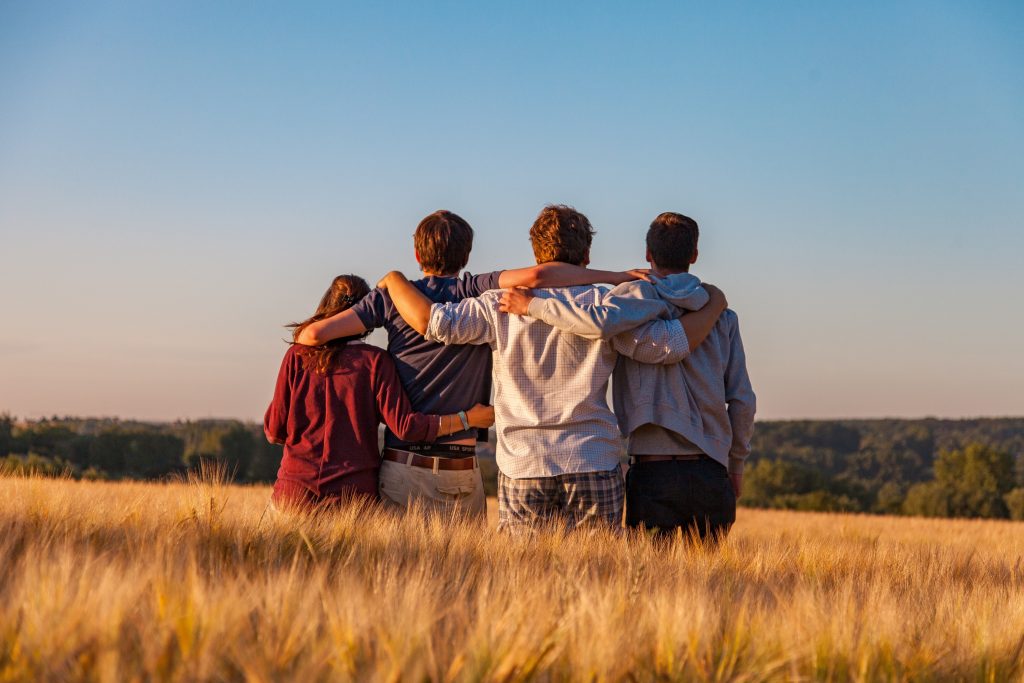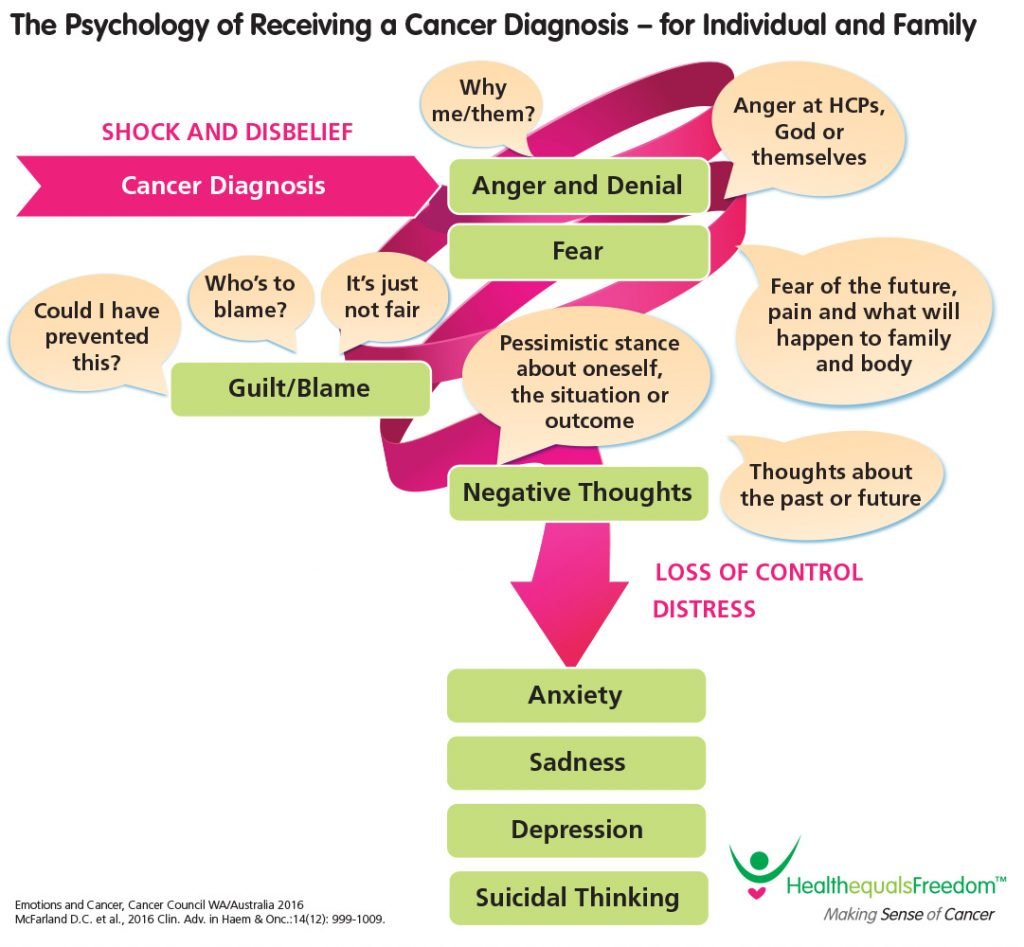Cancer Facts – Your Family want the very best for you

Cancer Facts – the family impact of a cancer diagnosis is complex and involved. I aim to make this an overview of key things to keep in mind without excessive detail.
You and everyone else when they first hear the word ‘cancer’ think you are going to die!
Your family often means the very best for you, but can often interfere, give strong opinions or go to water. Whatever happens your family can often be one of the most challenging parts of the whole diagnosis. Partly because your family members are also going through the same emotions of diagnosis you are, and they are panicking that you are about to die.

Many resources exist to support you as there should be, but far too often your family are left to flail around by themselves. Your family often has high levels of anxiety, stress and feelings of helplessness and hopelessness, which can often be accidentally projected on to you.
Everything from the ‘silent treatment’, fights, unsolicited advice, hypervigilance around things you ‘should do’ are common. For example, what you should eat, miracle cures (often from Google), radical surgery or chemotherapy, and temper tantrums can flare up in families with a cancer diagnosis.
It is important for family members to feel empowered too and to feel as if things are being managed well and they are being heard by you and the multi-disciplinary healthcare team.
As I mentioned there are often less resources for the family. Family members may need their own mental health plans (e.g. from their GP), need to practice their own self-care such as good quality sleep practices, healthy eating, meditation, supportive exercise and not using drugs such as alcohol to numb their confused feelings. Family members may also need regular respite and self-care time away from their diagnosed loved one.
Many Australians are estranged from family members
For many people, family is the centrepiece of their life. It’s where we gain a huge aspect of our identity, find comfort and support, and a sense of belonging.
Another difficult fact, which is often not talked about in Australia is that many families have had a break-down in communication and are estranged, or in other words the relationship has broken-down. This estrangement happens due to breakdown of trust, emotional intimacy and where there are strong, disparate values.
Latest estimates have 1 in 25 Australian’s will be estranged from family members at some stage of their life.
But for those who are estranged from their families, bereft of contact and informally ‘separated’, the family unit may not feel as safe or as nurturing. This is difficult during cancer treatment and recovery (Agllias K. 2018). If you are estranged from your family you may need other support, such as from friends, an advocate, groups or clubs, counsellors, social worker or your psychiatrist.
If you don’t have these it will be important to find support if you have had a cancer diagnosis, while you might not be used to asking for help, this might just be the time to do so.
Tips for your family when taking to you
The main think to keep in mind is they are the same person as they was before the diagnosis:
don’t act weird,
take cues from them,
smile,
choose your words carefully,
practice active listening,
use caution when asking questions,
don’t give your advice on other people and cancer, you are likely to have bias and a limited understanding of your colleague’s situation,
talk about topics OTHER than cancer!
Partners of the diagnosed person
It is normal for your partner to feel similar emotions to you: shock, numbness, anger, uncertainty, helplessness, fear, sadness, depression or anxiety.
Family members need back-up too, particularly if they are taking on extra tasks that you would normally do.
No matter how secure your relationship, a new diagnosis can put extreme pressure on your relationship short and long-term and cancer definitely affects the intimate relationships of most couples.
Your partner may be the conduit to other members of the family for information and status updates about you.
One of my clients setup a closed Facebook group with updates, to save time and minimise the constant interruptions by family members and friends, particularly during chemo treatments when they and their spouse were too stressed and tired to be at everyone’s beck and call, they had been going through a long cancer journey.
Knowing as much as is possible at this time, about the disease and diagnosis and the likely outcomes of treatment, can really help your partner feel in more control of a situation that is often one that stirs up so much helplessness. However, you don’t have to be the ‘expert’ on all things cancer, that is what you have your multi-disciplinary team to do for you.
Research shows that accessing support early may make a difference to both short and long-term psychological wellbeing for both your partner and you.
Healthy active communication is key. Honest and open is the most helpful for everyone concerned. If you need help with healthy communication strategies then accessing a psychologist, psychiatrist, cancer coach, or nurse can help in to improve communication in your home.
Children of the diagnosed person
Children often guess there is something wrong, even if they don’t know what, they are often very intuitive.
Unfortunately, research shows that children of a parent diagnosed with cancer are at higher risk of mental illness than other children. As parents are often distressed themselves it is hard for them to recognise distress in their kids.
It is important to explain to your children, cancer is not their fault or anyone’s fault and you have a team of clever people around you to help heal the cancer along with your amazing body.
To help children to cope with your cancer the following may assist:
- Reassure them that you love them,
- Reassure them that cancer is not contagious,
- Give them the opportunity to discuss their feelings and fears,
- Do things together,
- Answer any of their questions simply and honestly.
In general, the way children respond to your diagnosis depends on their age, maturity and the coping and communications styles developed in your family. For example, if in your family you are not in the habit of discussing difficult topics and emotions, your children may also not be able to express themselves in healthy constructive ways.
Depending on the age of your child a tailored customised approach is needed to help them cope. For example CanTeen is an organisation providing support for 12-25 year old’s dealing with cancer, and include support for those whose parents have a diagnosis. Younger children may need a different approach, in particular they need opportunities to play and express themselves, which can be difficult if the rest of your family is in shock or having ‘melt-downs’.
Other family members
Family members can also contact Health Equals Freedom for one-on-one coaching, group support and cancer facts. Contact us at 1800-I-SENSE (1800-473673) or send us an email. You can also contact 000 in an emergency or LifeLine (13 11 14) or Beyond Blue (1300 22 4636).
Friends
Most of your friends will be looking for a comfortable way of dealing with your diagnosis. Those that cannot cope may disappear, and that is OK. Your friends will look to you for guidance on how to behave with you. Be as honest and as open as you can. If friends offer to help, think if things they can do. Not only does it help you, but it also helps them feel useful at this difficult time.
Anyone can look at the Cancer Resources cancer facts we have put together for you.

References
Emotions and Cancer, Cancer Council of WA, Australia, 2016.
McFarland et al., Clin. Adv. Haem and Onc. 2016, 14(12): 999-1009.
Agllias K. Soc Work Health Care. 2018 Sep;57(8):620-636.
Shah B., et al., Anticancer Research, 2017, 37(8): 4025-4028.
